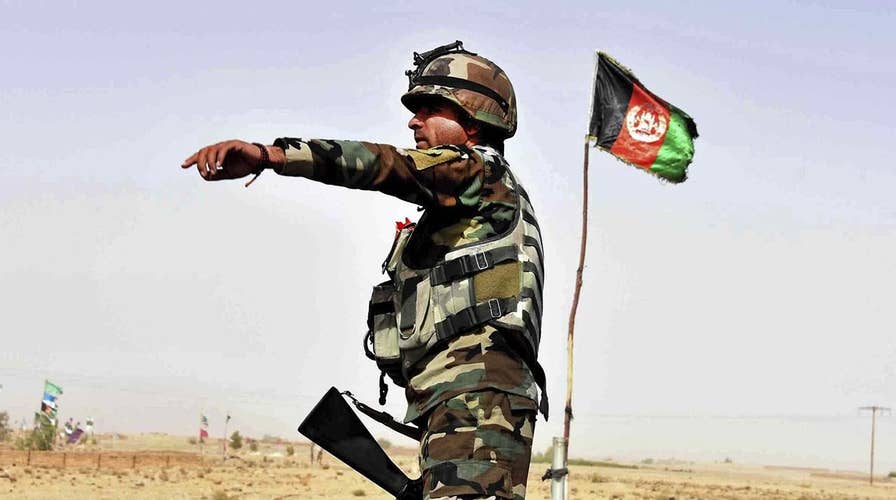After years of failed peace talks and following one of the deadliest weeks of suicide attacks on Afghan forces, the Trump administration is said to be pushing for the Taliban’s Qatar-based office to be closed down in an increasingly ironfisted approach to defeating the militant group.
The move comes at a time when the U.S. has beefed up its military strategy — deploying thousands more troops to advise and assist the Afghan soldiers, providing them with more warplanes and giving the top U.S. commander Gen. John Nicholson a greater authority to go after Taliban forces — in a quest to turn around a “stalemate” in the 16-year war against terrorism.
“The Taliban office has not been successful in achieving its purpose, namely to act as a venue to facilitate Afghan-led negotiation and reconciliation,” Amit Kumar, president of AAA International Security Consultants, told Fox News. “Rather, it is just giving dozens of Taliban representatives a place to seek refuge.”
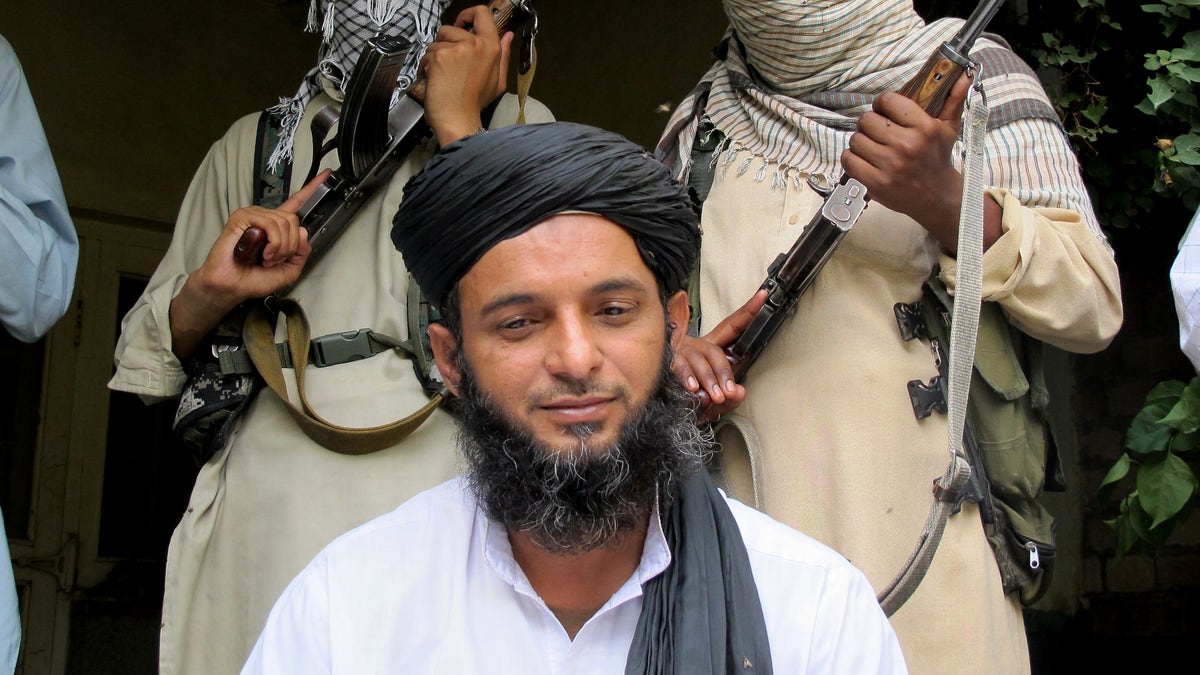
Asmatullah Muawiya, head of the Taliban's faction of fighters from central Punjab province, in 2013. (AP Photo/Ishtiaq Mahsud, File)
In 2013 — with support from American, Afghan and Qatari officials — the Taliban opened its first formal workspace after being ousted from power in the U.S. military intervention in 2001 in Doha. It was designed to be a reachable location for representatives to engage in peace talks in the conflict-riddled Afghanistan.
An estimated 25 Taliban members and their families reside in, and are given free passage, in the Qatari capital. This includes five former Guantanamo Bay detainees who were released by the U.S. three years ago, in exchange for U.S. Army Sgt. Bowe Bergdahl.
Trump has openly denounced the office as a failed Obama administration initiative. Subsequently, the office has come under increased scrutiny by some U.S. officials who view it as providing the insurgents with unwarranted legitimacy, a sentiment echoed by Afghan intelligence.
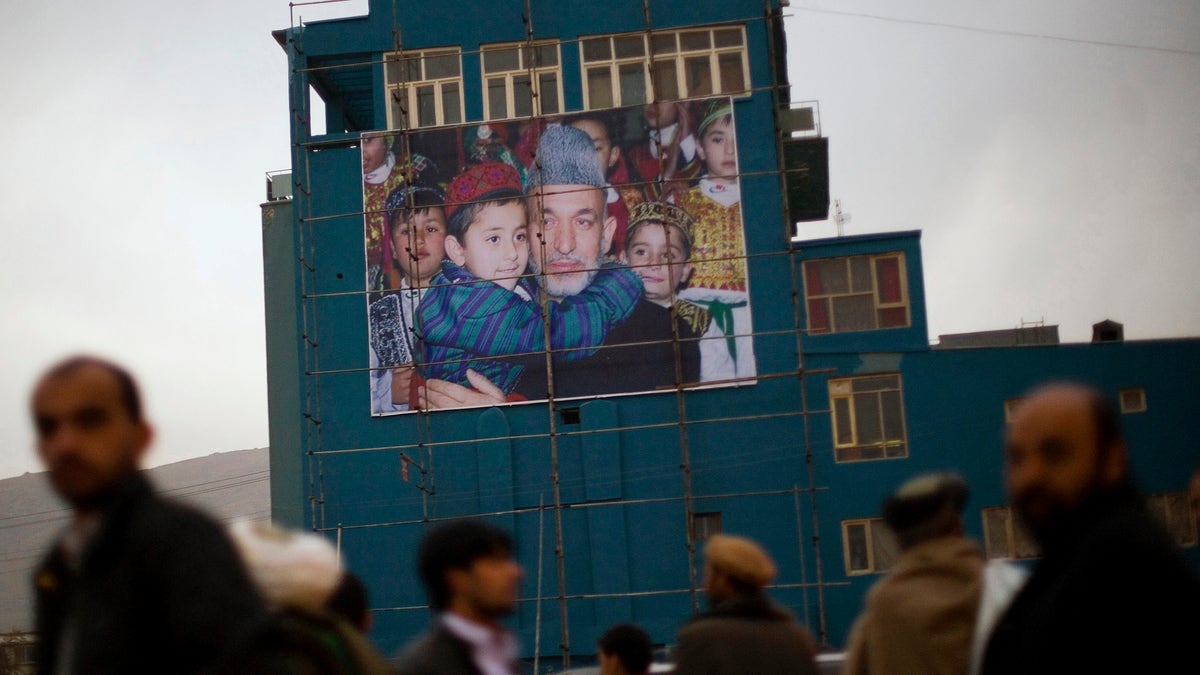
Afghan men waiting to get a ride out of the city line up next to a giant poster of Afghanistan's President Hamid Karzai in Kabul, in 2009. (AP Photo/Anja Niedringhaus, File)
“The Taliban considered the Qatar office political recognition for them and they erected the Islamic Emirate flag there. The office was supposed to be about ending violence but years after opening, it is used for fundraising and running private businesses,” Sunraise Kabuli, an official from Afghanistan’s chief intelligence agency, National Directorate of Security, alleged to Fox News.
Furthermore, critics have dismissed talks as a waste of time as it is unlikely the Taliban will agree to the terms of any deal that doesn’t guarantee the release of thousands of their prisoners from Afghan jails, and a prominent degree of parliamentary representation.
“The Talibs are Pashtun nationalists and want Sharia as the rule of law,” noted author and documentarian Robert Young Pelton, who has long spent time with Taliban and other insurgent groups in Afghanistan. “They are also out to build an Islamic nation like Pakistan, and see foreign influence as negative and destructive.”
PAKISTAN OFFICIALS ADAMANT THAT 'HERO' DOCTOR WHO HELPED CAPTURE USAMA BIN LADEN REMAIN BEHIND BARS
AFGHAN GOVERNMENT WELCOMES KABUL'S 'BUTCHER'
TILLERSON MAKES UNANNOUNCED SIDE TRIP TO AFGHANISTAN
A U.S. State Department official told Fox News to “stay tuned” in the matter, but noted that if the office does close, the announcement won’t likely come from the U.S. In a briefing earlier this month, spokesperson Heather Nauert noted that the “office” in Qatar was more just “a Taliban presence there,” and that “all of that is under consideration right now.” Ultimately, the decision to shutter their safe space would need to come from Qatar officials, even with U.S. backing and a formal request from the Afghan government.
Other experts have expressed concern that closing the office would be a grave error and that a diplomatic peace deal is the only way forward.
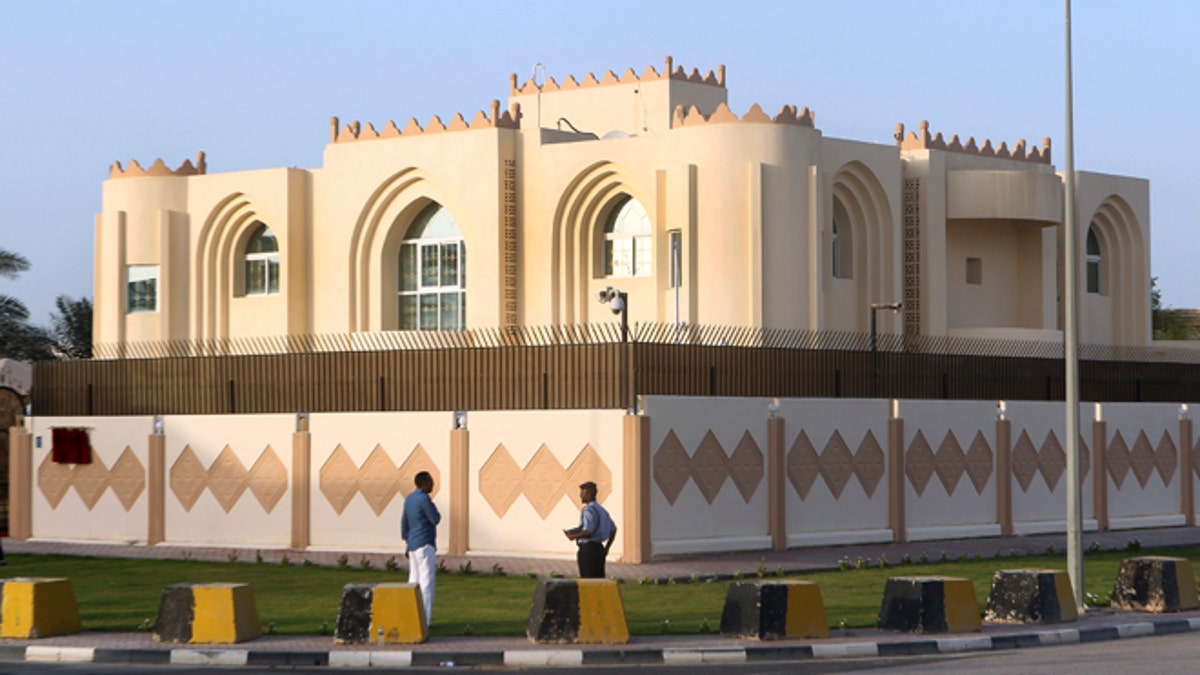
June 18, 2013: A general view of Taliban office in Doha before the official opening in Doha, Qatar. In a major breakthrough, the Taliban and the U.S. announced Tuesday that they will hold talks on finding a political solution to ending nearly 12 years of war in Afghanistan as the Islamic militant movement opened an office in Qatar. American officials with the Obama administration said the office in the Qatari capital of Doha was the first step toward the ultimate U.S.-Afghan goal of a full Taliban renouncement of links with Al Qaeda. (AP)
“If the Qatar office is closed, it would disperse Taliban and it can deteriorate the already established relations between the Afghan government and Taliban. It can also lead Taliban to close its doors for negotiations,” cautioned Afghan security analyst, Aziz Amin Ahmadzai. “It is and should be the goal of both Afghan government and its international friends to secure peace deal and bring peace to this war-torn country otherwise peace is impossible.”
And while the fate of the Qatar office is likely to be determined in the coming weeks, international governments are attempting to revive talks elsewhere without their participation. U.S. officials last week met with delegations from China, Pakistan and Afghanistan on the matter. The U.S. wants Pakistan to work harder in destroying Taliban sanctuaries in the country and exert a stronger influence in encouraging them to come to the table and lay down their arms.
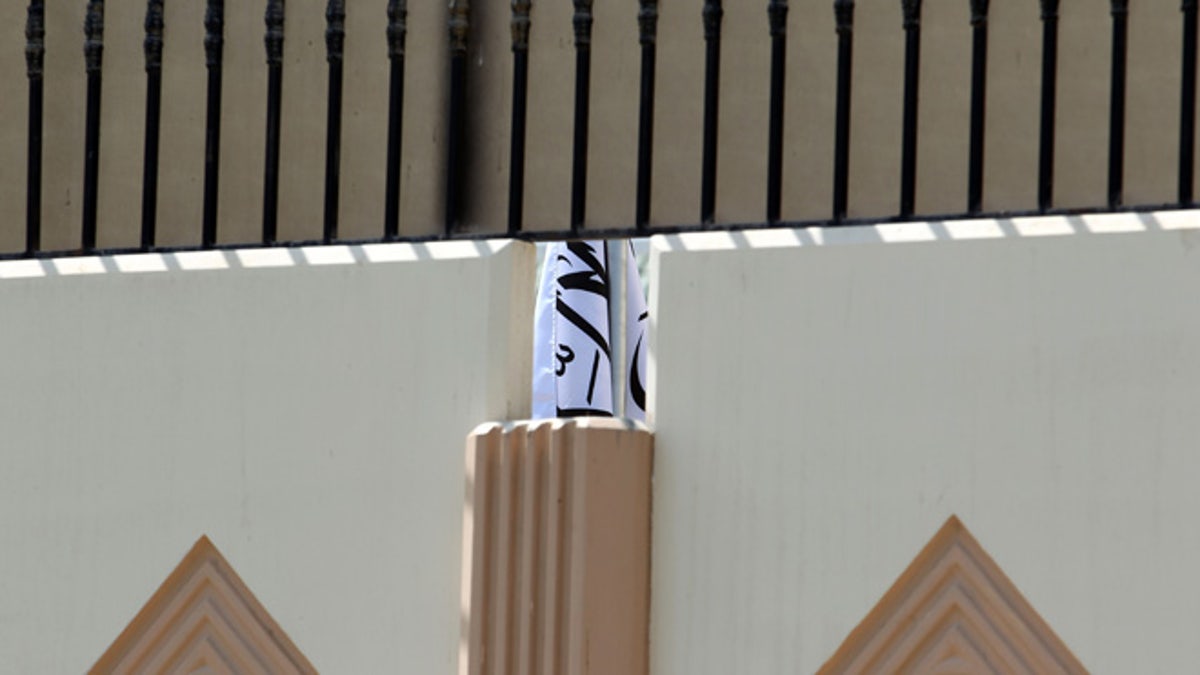
This photo taken on Thursday, June 20, 2013 shows the Taliban flag visible through a gap in a wall of the new office of the Afghan Taliban in Doha, Qatar after the opening of the office. (AP)
But for its part, Pakistan is continuing to deny protecting militants and claim their clout on the Taliban has diminished. According to Aizaz Chaudhry, Washington's Ambassador to Pakistan, they tried twice to bring them to the table but “those attempts were scuttled,” and the buck stops with Afghan officials — not them.
“Now we are going after the Taliban, so our ability to bring them to the table has been eroded to an extent. But we believe it is a shared responsibility,” he told Fox News last month. “And most of all, it is the Afghan government which must send unambiguous messaging to the Taliban that they have more to gain from the table than the battlefield. One day they call them brothers, the next day terrorists. The Taliban does not have a global agenda, it is an Afghan-specific agenda, so it is up to the Afghan government to work out a peaceful solution.”
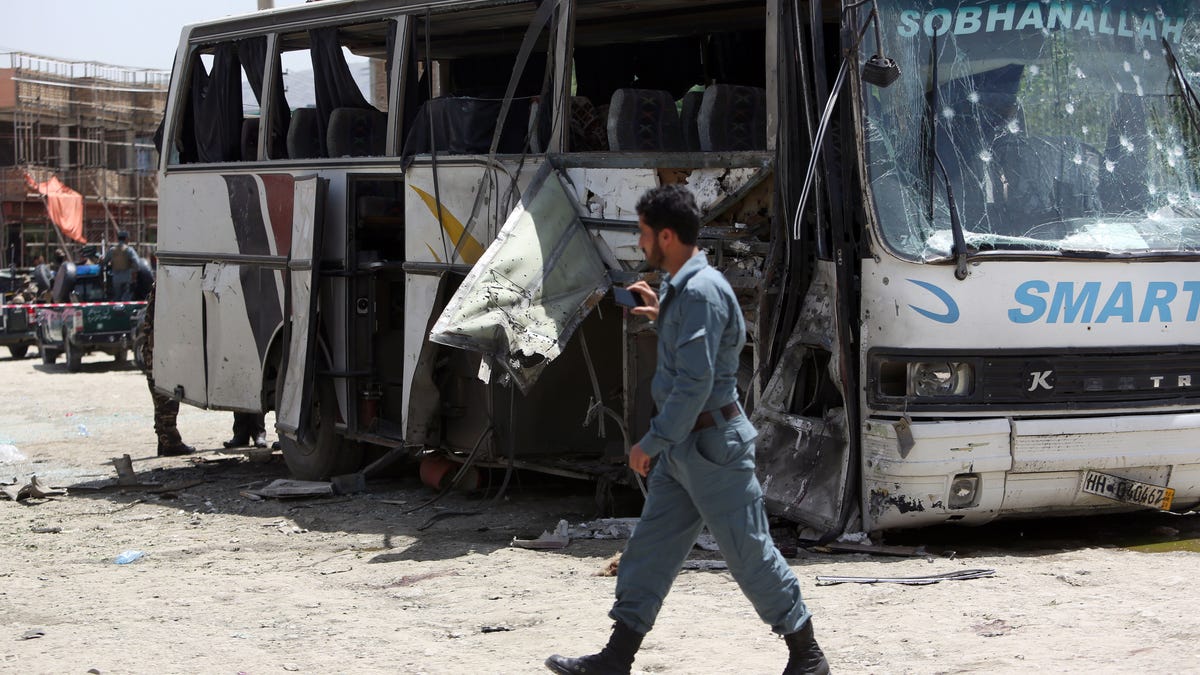
May 4, 2015 - An Afghan security man inspects the site of a suicide attack in Kabul, Afghanistan. An Afghan official says a suicide bomber struck a minibus carrying government employees in Kabul, killing at least one person and wounding more than a dozen. (AP)
Nonetheless, Afghans are expressing hope that Trump’s renewed attention somehow will bring an end to what has become an almost intolerable level of bloodshed.
“Almost 15 percent of our population has been killed or disabled, almost 20 percent of Afghans have become refugees,” Kabuli added. “Can you imagine?”
